|
|
|
Sort Order |
|
|
|
Items / Page
|
|
|
|
|
|
|
| Srl | Item |
| 1 |
ID:
181047
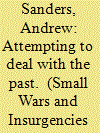

|
|
|
|
|
| Summary/Abstract |
Over the summer of 2019 a number of maroon banners appeared across towns and cities in Northern Ireland, declaring that the local population ‘stands with Soldier F’. Soldier F was a member of the Parachute Regiment who, in March of 2019, was charged with the murders of James Wray and William McKinney and five additional attempted murders as a result of his actions on Bloody Sunday, 30 January 1972. These charges were announced at a time when it was reported that up to 200 former members of the British Army could face official investigation for their conduct in Northern Ireland. These cases sit at the centre of the sensitive and divisive issue of the legacy dimension of the Northern Ireland conflict, posing a challenge to the continuing success of the Northern Ireland peace process. Engaging a developing literature on post conflict reconciliation processes, this article will analyse the issue of legacy prosecutions from Operation Banner.
|
|
|
|
|
|
|
|
|
|
|
|
|
|
|
|
| 2 |
ID:
181048
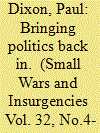

|
|
|
|
|
| Summary/Abstract |
There are contrasting interpretations of the Northern Ireland peace process which have competing implications for the lessons to be drawn from the conflict. This article offers a Constructivist Realist critique of three leading perspectives on the peace process: Neoconservative, Cosmopolitan and Conservative Realists (or Consociationalists). The Neoconservative perspective emphasises the importance of security policy in defeating terrorists before negotiations. By contrast, Cosmopolitans and Conservative Realists emphasise the importance of constitutions and tend to ignore security. Constructivist Realists argue that all three accounts are over-generalised, provide inadequate understandings of politics and, therefore, the relative success of the peace process.
|
|
|
|
|
|
|
|
|
|
|
|
|
|
|
|
| 3 |
ID:
181041
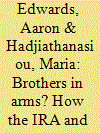

|
|
|
|
|
| Summary/Abstract |
Throughout the 1950s Britain faced unprecedented challenges to its imperial rule. Civil disobedience, insurgency and terrorism gripped its colonies as the flames of nationalism and anti-colonialism burned brightly across the world. In two of Britain’s most important Cold War strategic outposts, Northern Ireland and Cyprus, insurgents belonging to the IRA and EOKA launched armed campaigns to undermine British rule. This article examines the insurgencies on both islands in the period 1955–59, comparing the respective approaches taken by the IRA and EOKA to guerrilla warfare. Drawing on original English and Greek language sources, as well as other empirical evidence, the article argues that the IRA and EOKA interpreted their struggles in complementary ways as part of a broader national liberation struggle, which, above all, suggests a shared understanding of British imperialism. Admittedly, beyond a mutually perceived ‘brotherly bond’, IRA leaders did not apply specific military lessons they had learned from members of EOKA while in English prisons in the 1950s until the much later Northern Ireland ‘Troubles’. Nevertheless, we argue that it is important to look at the genealogy of ideas for it reveals broader patterns regarding the organisational learning of militant groups engaged in campaigns against a common enemy.
|
|
|
|
|
|
|
|
|
|
|
|
|
|
|
|
| 4 |
ID:
181046


|
|
|
|
|
| Summary/Abstract |
The accepted knowledge concerning dissident splits from the Provisional IRA is that different groups or individuals broke away because of their disagreement with the political progresses made during the peace process. This paper will argue that other factors were at play. Primarily, that ‘deviant’ cohesion played a significant role. While the question of politicialisation offers significant insight into the political dimension of this split, this article will adopt a more sociological approach. Answers provided through this sociological perspective are not intended to undermine the political explanation, rather to build upon them and provide a more holistic understanding of the issue.
|
|
|
|
|
|
|
|
|
|
|
|
|
|
|
|
| 5 |
ID:
181045


|
|
|
|
|
| Summary/Abstract |
The United Kingdom’s (UK) decision to leave the European Union (EU) has been felt most acutely in Ireland. One group specifically impacted by this decision is Ulster Loyalism. With a historic ‘warrior regime’ role in defending its community, both from irredentist Irish Nationalism and British government subterfuge, how Loyalism responds to Brexit is uncertain. Historically, Loyalism has promoted political violence to stymie UK strategic objectives in Ireland. Therefore, any attempt to diminish the Union between Great Britain and Northern Ireland raises the prospect of a rejuvenated loyalist terror campaign being directed at those it deems a threat to the loyalist community and their territorial sovereignty in Northern Ireland. In its current ‘post-ceasefire’ guise, there appears to be no immediate threat of a loyalist return to violence. Yet, with Sea Border and a nascent ‘Shared Island’ approach enacted by the Irish Government, promoting a regulatory alignment with the EU, Northern Ireland is once again at a crossroads. How Ulster Loyalism responds to such developments then posits a key question for both UK and EU intelligence agencies, on how they respond to any upsurge in loyalist paramilitary violence in a post-Brexit era.
|
|
|
|
|
|
|
|
|
|
|
|
|
|
|
|
| 6 |
ID:
181043
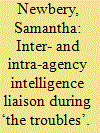

|
|
|
|
|
| Summary/Abstract |
Intelligence is crucial to success in counter-terrorism, and successful intelligence work involves effective liaison between and within all the organisations involved. Scholars rarely address intelligence in counter-terrorism other than through case studies, while studies of intelligence in counter-insurgency and studies of international intelligence liaison emphasise the value of intelligence liaison with little attention to how it works in practice. This article substantially expands existing knowledge and understanding by focusing on intelligence coordination within Northern Ireland in the 1990s. It draws on heretofore unexploited, yet voluminous, original material. It analyses the contribution that computerisation made to inter-agency liaison, the contribution the Northern Ireland Prison Service made to intelligence work, the role played by intra- and inter-agency structures and the valuable work that the right individuals in the right posts can do. This article thereby provides a broader and deeper understanding of the challenges faced by state agencies and how some of these were overcome to facilitate inter- and intra-agency intelligence liaison in Northern Ireland in the 1990s. It therefore contributes to emerging theory that seeks to explain intelligence.
|
|
|
|
|
|
|
|
|
|
|
|
|
|
|
|
| 7 |
ID:
181038


|
|
|
|
|
| Summary/Abstract |
Ireland’s ‘decade of centenaries’ means different things to different people.1 On the one hand, for Irish nationalists in Northern Ireland and the Republic,2 the term refers to the period bookended by the second reading of the Home Rule Bill in May 1912, which promised a degree of self-government for the island, and the ending of the Irish Civil War in May 1923. On the other hand, for Ulster unionists,3 the September 1911 march against Home Rule represented a mobilization of some 70,000 people that inspired the following year’s ‘Ulster Day’ where over 500,000 men and women signed the Ulster Covenant pledging resistance to Home Rule.
|
|
|
|
|
|
|
|
|
|
|
|
|
|
|
|
| 8 |
ID:
181039
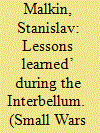

|
|
|
|
|
| Summary/Abstract |
Historians generally view the Irish War of Independence as the first and largely unsuccessful experience for the British army in conducting modern counterinsurgency. This article argues that during the Interbellum the ‘Irish war’ became a starting point for the military thought about this type of conflict, although this did not become fully consolidated in the army’s thinking. Some important aspects of the British forces’ conduct in the ‘Irish war’ remained undervalued, not least because of the only official analysis of this conflict, ‘The Record of the Rebellion in Ireland’, was classified for a long time. It strongly challenges traditional and revisionist understanding of this conflict and its implications on the British way of counterinsurgency during the Interbellum. These contradictions between documentary evidence from archives and established methods of historical thinking, as well as correlations of archival material with our understanding of modern counterinsurgencies, will be contrasted and analysed in this article.
|
|
|
|
|
|
|
|
|
|
|
|
|
|
|
|
| 9 |
ID:
181042
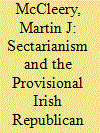

|
|
|
|
|
| Summary/Abstract |
This article addresses the scholarly debate over sectarianism and the Provisional Irish Republican Army’s (PIRA) campaign during the Northern Ireland Troubles. It argues that although there is much merit in the contributions made in this discourse, unfortunately, for, the most part, there is a lack of engagement with the deeper meaning of sectarianism. Consequently, it seeks to enhance the understanding of sectarianism within this arena before considering the nature of the PIRA campaign. By conducting a thorough analysis of the killings conducted by this organisation in the early years of the conflict it is ultimately concluded that, at the very least, PIRA tolerated, and likely sanctioned, sectarian violence from within its ranks.
|
|
|
|
|
|
|
|
|
|
|
|
|
|
|
|
| 10 |
ID:
181040


|
|
|
|
|
| Summary/Abstract |
This article assesses the extent, geography and nature of ‘forced disappearances’ carried out by the Irish Republican Army during the Irish Revolution of 1919–1923. The victims were either Irish civilians suspected of being spies and informers working for British intelligence, or members of the British army and Royal Irish Constabulary. It reveals the scale of these secret killings as a phenomenon that developed in the context of the IRA’s military strategy during the Irish War of Independence. Disappearances continued at a far lower level during the Truce (largely in Co. Cork), and almost ceased during the Irish Civil War of 1922–1923. The study found that rather than being a nationwide military strategy forced disappearances were the initiative of local IRA units, with those in Co. Cork (notably Cork 1 Brigade), displaying a more ruthless attitude to this tactic than elsewhere. Civilian targets (the majority of whom were ex-soldiers) were usually assumed by the IRA to be dangerous British intelligence assets. This was also the case with many crown force targets, but others were simply opportunistic killings.
|
|
|
|
|
|
|
|
|
|
|
|
|
|
|
|
| 11 |
ID:
181044
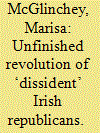

|
|
|
|
|
| Summary/Abstract |
In April 2019, a so-called ‘dissident’ republican New IRA gun-man killed journalist Lyra McKee, whilst firing at police during a riot in Derry in the North of Ireland. The New and Continuity IRAs remain wedded to an armed campaign for Irish sovereignty, drawing legitimacy from partition and the ongoing British ‘presence’ in Northern Ireland – and rejecting the significance of altered conditions within the state. Conversely, independent ‘dissident’ republicans, formerly in the Provisional IRA, criticise the ongoing campaign by the groups as futile. This article examines key areas of debate within the ‘dissident’/radical republican base, on armed actions at present – drawing on unpublished qualitative interviews with independents, the RSF Movement, and Saoradh,– the organisation believed to be the political wing of the New IRA. This article assesses the nature of the campaign waged by the Continuity and New IRAs and examines whether it represents a continuation of the Provisional IRA campaign, or a new departure.
|
|
|
|
|
|
|
|
|
|
|
|
|
|
|
|
|
|
|
|
|